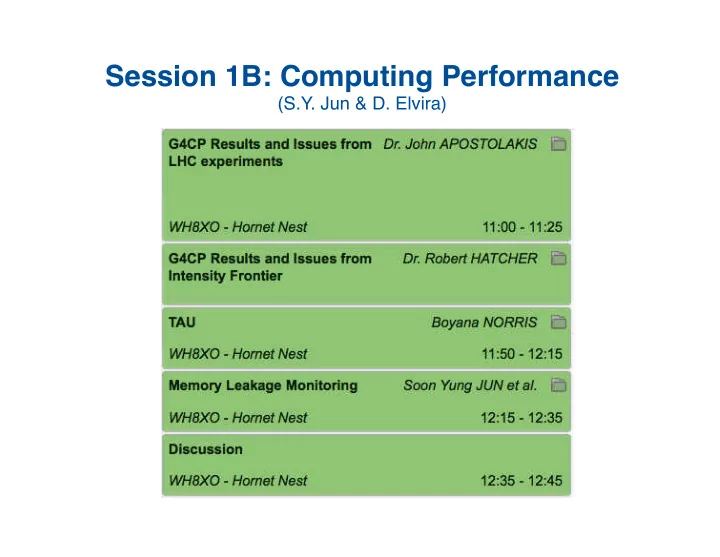

Session 1B: Computing Performance (S.Y. Jun & D. Elvira)
CPU Performance: ATLAS&CMS (John Apostolakis)
Geant4 Status in CMS • 2015 production: 10.0.p02 (sequential), QGSP_FTFP_BERT_EML, ~ 5 billion events (2015) (+ ) – CPU • Technical performance Improvements for Run 2 – Upgrade to 10.0 (~5%) – Russian Roulette (~30%) – CMSSW optimization (~15%) – Library repackaging (~10%) 3
Geant4 Status in CMS • Multi-threaded Geant4 (10.0p03) is fully integrated with CMS multi-threaded framework – plan to use it in production 2016 • Performance of CMS MT GEN- SIM (CHEP2015) – Excellent scaling performance in Time/Event – ~2 GB RSS for 12 single threaded jobs (+200 MB per thread) 4
Geant4 Status in ATLAS • Integrated Sim. Framework (ISF) use almost all production. – 9.6 full simulation used in 80% of production (ratio will drop) – Expect move to 10.1 for next campaign (end 2015) • Stability and production – Crash rate: ~1.5% failure for jobs of 1,000 events (unacceptable) – The Multi Level Locator has proven to be a weakness • Hot spots and remedies – Neutrons take a lot of CPU time. – Might seek to use available biasing features • Memory – use and churn – Memory consumption is significant, but not enormous concerns – Memory churn was issue, but Geant4 no longer dominates churn • Seen potential of static builds vs DLLs (difficult for ATLAS) • Reasonably advanced prototype of MT app for Cori 5
6
7
8
IF Summary • A variety of programs – hard to generalize CPU/memory uses • Still use relatively old versions of Geant4 (9.2, 9.4, 9.6) • Generally, open to new technology (MT, track parallelism, multi- cores, etc) if no extra efforts are necessary • Effort underway to centralize MC production needs and estimate required resources • G4CPT will seek for representative applications to evaluate computing performance of IF-experiments (profiling and benchmarking) 9
10
11
12
TAU • Low overhead • Comprehensive • Hardware counters and derivative metrics • Inclusive vs. exclusive • Variety of meta-tools for sophisticated analysis • … 13
Ex: TAU for Geant4 • Interactive canvas – Application – Trial – Metric (PAPI HWC) – Thread (multi/many) • DB-based analysis • Working in progress – Add more analysis – Add display options 14
Memory Leakage Monitoring S. Y. Jun (Fermilab), G. Cosmo (CERN), A. Dotti (SLAC) 20 th Geant4 Collaboration Meeting at Fermilab Sept. 28 - Oct. 2, 2015
Memory leak • Leaks from Geant4? - relatively clean. Two distinct types: – Memory allocated at initialization, but not explicitly released at the end of program (the majority of the cases, less critical) – Memory allocated within the event loop, but not freed (the most critical and relevant for production runs in the experiments) • Problem Statement: – Indication of a poor design for ownership or lifetime of objects – Reduce existing memory leaks – Monitor newly introduced leaks • Tools – Igprof (a low-overhead memory profiler - memory footprints) – Valgrind (a great tool for memcheck, but too slow - complete) – Coverity (a static code analysis) – a custom monitoring tool (under developing - efficient) 16
Valgrind Tests: (ex: Geant4 10.2.beta) • Output: /afs/cern.ch/sw/geant4/dev/QA_tools/Valgrind/logs/ • Definitely Lost: no pointer to the block can be found (i.e, lost the pointer at the earlier point) – 19 test for major releases ~1M bytes • Geant4 code being released is relatively clean 17
Summary of Coverity Analysis • Static analysis: http://coverity.cern.ch/ (289 issues under G4) • Two types of resource leaks (39) under the Geant4 project – new on a data-member and does not free it – a new of an object in a method and no clear ownership class ¡G4Something; ¡ class ¡G4Class ¡{ ¡ ¡ ¡ G4Something* ¡pointer; ¡ ¡~G4Class() ¡{ ¡/*?? ¡should ¡I ¡delete ¡pointer??*/ ¡} ¡ ¡void ¡set( ¡G4Something* ¡p) ¡{ ¡pointer ¡= ¡p;} ¡ ¡ ¡G4Something* ¡get() ¡const ¡{ ¡return ¡pointer; ¡} ¡ }; ¡ //Usage ¡ ¡ ¡G4Something* ¡smt ¡= ¡new ¡G4Something; ¡ ¡ ¡G4Class* ¡cls ¡= ¡new ¡G4Class(); ¡ ¡ ¡cls-‑>set( ¡smt ¡); ¡ //Who ¡owns ¡smt? ¡Who ¡should ¡delete ¡it? ¡ • Use std::unique_ptr and move – make ownership explicitly 18
A Custom Memory Leak Monitor • Check unreleased memory at the exit of an application – A very light leak monitoring tool (efficient) and complimentary to Valgrind (correctness) • Push/pop memory alloc/dealloc during an application is running and dump undeleted pointers at the end program – Override new and delete (new[] and delete[]) with custom operators by adding/removing the address of the caller void* ¡operator ¡new(size_t ¡size, ¡const ¡std::nothrow_t&) ¡_NOEXCEPT ¡ { ¡ ¡ ¡ ¡ ¡return ¡new(size, ¡(char*)__builtin_return_address(0),0); ¡ } ¡ – builtin_return_address(0) : return address of the current function – addr2line(pointer) : convert the address of pointer to the file name and line number 19
A Custom Monitoring Tool (exampleB2b) • Summary • List of file names and line numbers for undeleted objects • Run the memory leak monitor for each reference release – Select representative examples/tests – Post the list of potential leak (file names and line numbers) – Report a summary (and changes by the release version) 20
Thank You to All Contributors 21
Recommend
More recommend